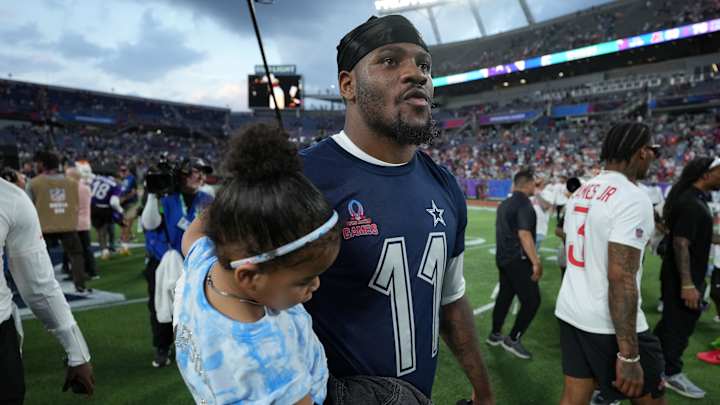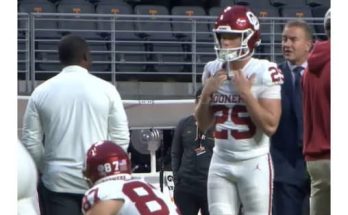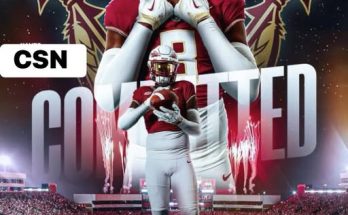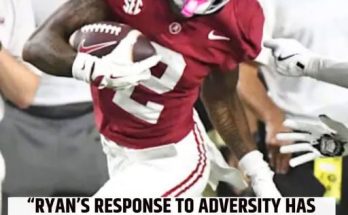Micah Parsons’ Shocking Revelation on Alabama’s Football Offer Sparks Controversy
Micah Parsons, one of the NFL’s brightest young stars, made a bombshell statement recently that has ignited a firestorm of controversy within the college football world. The 2021 NFL Defensive Rookie of the Year, known for his remarkable abilities as a linebacker for the Dallas Cowboys, revealed startling details about a football offer from the University of Alabama that was extended to him during his high school recruitment. The revelation has not only raised questions about recruiting practices, but it also shines a light on the hidden complexities of college athletics, power dynamics, and the role of NIL (Name, Image, and Likeness) in shaping the future of the sport.
The revelation came in an unexpected interview with a sports podcast, where Parsons reflected on his college recruitment and how Alabama—one of the most successful and storied football programs in the country—approached his recruitment. Parsons’ shocking disclosure has sent ripples throughout the sports world, shaking the very foundation of the college recruiting system. This article will dive deep into Parsons’ comments, the context of Alabama’s alleged offer, the controversy it sparked, and what it means for the future of college football recruiting.
Micah Parsons: From High School Standout to NFL Star
Before we dive into the specifics of Parsons’ revelation, it’s important to understand the trajectory that led him to where he is today. Micah Parsons was a highly sought-after football prospect coming out of high school. As a linebacker at Harrisburg High School in Pennsylvania, Parsons displayed a blend of size, speed, and football IQ that made him one of the top players in the country. His recruitment process was one of the most high-profile in his class, and many of the top programs in college football courted him, including Alabama, Penn State, Ohio State, and others.
Parsons ultimately chose Penn State, where he played for two seasons before declaring for the NFL draft. His decision was largely based on his desire to stay close to home and the chance to contribute early at Penn State. However, the details of his recruitment process, particularly his interactions with Alabama, were less publicly discussed—until now.
In a revealing podcast interview, Parsons opened up about what transpired during the recruiting process and shared what he claimed was an eye-opening experience with Alabama’s staff. His remarks have since gone viral, with many questioning not only the practices of Alabama’s recruiting staff but the broader issue of college football recruitment as a whole.
The Shocking Revelation: What Parsons Said About Alabama’s Offer
During the interview, Parsons disclosed that he had received a scholarship offer from Alabama, but with some stipulations that he found to be both shocking and disheartening. Parsons claimed that he was told, at the time, that Alabama’s program would offer him a spot, but only under the condition that he would first have to be a “part-time recruit” for their NIL program. According to Parsons, the offer would have required him to participate in endorsement deals and marketing opportunities, even before committing to the program.
While the notion of NIL deals isn’t necessarily surprising in today’s era of college sports, the idea that a program like Alabama would push an elite recruit into a deal before even officially joining the team was something that raised eyebrows. Parsons specifically mentioned that Alabama seemed less concerned with his football development and more focused on how much money he could bring in through various promotional ventures. This, he claimed, was one of the key reasons he ultimately decided to commit to Penn State instead.
The revelation that Alabama—a program known for its tradition and success on the field—was allegedly willing to offer a recruit an NIL deal before even signing a letter of intent has sparked intense debate. While many fans and observers have long been aware of the power that elite programs wield in recruiting, Parsons’ comments brought into sharp focus the growing role of money and marketing in the process.
The Response from Alabama’s Camp
As the story broke and went viral, Alabama quickly found itself in the crosshairs of both the media and college football fans. The university, along with head coach Nick Saban, has yet to comment publicly on Parsons’ revelation. However, sources within the program have expressed surprise at the nature of the claims, stating that the program adheres to strict recruiting guidelines set forth by the NCAA, and that NIL deals have always been secondary to a player’s commitment to the team.
However, the fact that Parsons made these comments at all raises questions about Alabama’s recruiting practices and the larger trend of college programs leveraging NIL opportunities to lure recruits. If what Parsons said is true, it would indicate that Alabama, like several other top programs, may be using NIL as an additional tool in its already powerful recruiting arsenal. With schools now having the ability to use NIL deals to sweeten recruitment offers, it’s become clear that money is no longer an afterthought in college football—it’s central to the game.
Given Alabama’s longstanding dominance in college football, it’s difficult to ignore the implication that the Crimson Tide might have been leveraging its financial power to secure top recruits. This potential for financial incentives to overshadow the focus on player development raises concerns that college football might be shifting toward a system where the best offers are not necessarily the ones focused on long-term success on the field, but rather short-term monetary gains.
The Growing Role of NIL in College Football Recruiting
Micah Parsons’ revelation comes at a time when NIL deals have become a focal point of college athletics. In 2021, the NCAA adopted an interim policy that allowed college athletes to profit from their name, image, and likeness. This decision has revolutionized the college sports landscape, with players now able to sign endorsement deals, profit from social media, and secure contracts with brands and companies.
While NIL deals have been widely celebrated for providing college athletes with financial opportunities that were previously unavailable to them, the implementation of NIL has also raised serious concerns about the potential for exploitation and the inequities that could arise between programs with more resources and those with less. Parsons’ claims have further underscored these concerns, particularly in the context of elite programs like Alabama, where financial resources are vast, and the pressure to win championships is immense.
The new NIL landscape has shifted the focus of college recruiting, with schools offering athletes lucrative deals in exchange for their commitment to the program. The traditional model, where athletes were primarily focused on choosing a school based on academics, football development, and team culture, is now being challenged by the growing influence of NIL, as programs use financial incentives to persuade athletes to commit.
The Controversy: Is NIL Changing the Integrity of College Football?
The controversy surrounding Parsons’ comments on Alabama’s alleged offer brings to the forefront a broader debate about the role of money in college football. For many, the growing reliance on NIL deals in recruiting is seen as a necessary evolution of the sport, one that allows players to benefit from their talents while in college. However, others worry that the focus on financial compensation could erode the integrity of the college game.
Critics argue that offering NIL deals before players even sign with a school undermines the fundamental premise of college athletics. Instead of being drawn to a school because of its football program or educational offerings, recruits may now be swayed by the size of the financial package that a program can offer. This could lead to a system where elite players flock to programs with the most lucrative deals, leaving smaller schools without the resources to compete for top talent.
Additionally, there are concerns about the long-term effects of NIL deals on the college football landscape. If recruiting becomes more about financial incentives than football development, it could have serious implications for player development and the overall competitiveness of the sport.
What Does This Mean for College Football’s Future?
Parsons’ revelation may be a glimpse into the future of college football, where NIL deals are not just a secondary benefit, but a key factor in recruiting and player decision-making. While the NCAA has made moves to regulate NIL and maintain some level of fairness, the system is still in its early stages, and questions about its impact on college athletics remain unanswered.
As NIL deals continue to grow in prominence, the dynamics of recruiting will undoubtedly shift. Top programs like Alabama, with their extensive resources, may have the upper hand in securing high-profile recruits, while smaller programs could struggle to compete in a system that places such a heavy emphasis on financial compensation.
Micah Parsons’ shocking revelation has ignited a crucial conversation about the intersection of money, recruitment, and college athletics. While NIL deals provide players with valuable opportunities, they also raise serious questions about the integrity and future of college football. As the sport continues to evolve, it will be up to the NCAA, schools, and players themselves to navigate the challenges of this new era and ensure that college football remains competitive, fair, and focused on the development of student-athletes both on and off the field.



